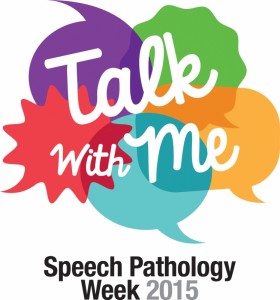 Speech Pathology week is coming soon, and we love this year's theme "Talk with me" so much we are celebrating all month, starting at the beginning with babies and toddlers.
Speech Pathology week is coming soon, and we love this year's theme "Talk with me" so much we are celebrating all month, starting at the beginning with babies and toddlers.
Babies are born pre-programmed to tune into the speech around them and to their parents voices specifically, so it is never too soon to start talking with your baby. Simple things you can do every day can make a real difference to your child’s language skills and set them up for future learning success.
Here are our top 10 things for talking with babies and toddlers:
1. Talk together every day. Talk to your child whenever you can, as you go about daily activities like cooking, bathing, dressing, feeding, nappy changes, getting ready for bed. Looking after babies and toddlers takes up a lot of time but this time can be used for learning and building relationships as you get the practical things done. It won’t take any extra time and if your child is interested and engaged in what you do they will probably cooperate better too.
Make a special talking time each day where you just focus on talking with your child for a few uninterrupted minutes. Talk as you play, sing, say rhymes or look at a book.
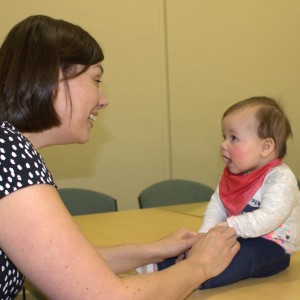 2. Get down to your child’s level and face to face. Ensure your child can see your face when you are talking to them. This helps them focus, lets them see and hear your words better and encourages them to copy you. This might mean getting down on the floor, putting your child in your lap, cuddling up together on a couch or bed or sitting them up in a high chair at the table with you.
2. Get down to your child’s level and face to face. Ensure your child can see your face when you are talking to them. This helps them focus, lets them see and hear your words better and encourages them to copy you. This might mean getting down on the floor, putting your child in your lap, cuddling up together on a couch or bed or sitting them up in a high chair at the table with you.
3. Follow your child’s lead when you talk. Take some time to see what holds your child’s interests. Watch what they look at, touch, hear and reach for and talk with them about these things. Put out a range of toys or books and see which ones they choose. Watch what they do and copy them and talk about what they are doing.
4. Use simple clear speech when talking with your child. There is no need to use “baby talk’. It is better for your child to hear real words spoken correctly, but do keep your words simple and your sentences short in the beginning. Gradually make them longer as your child develops. Speaking sentences just one or two words longer than what your child can say is usually about right. This means mostly single words and short phrases for babies.
If your child makes up their own words for things or says them in an unusual way, repeat the right word back to them now and then, so they hear the word the correct way and they will use it correctly when they are ready. Don’t repeat your child’s errors. When your child can talk, repeat and expand what they say to keep them developing their language skills.
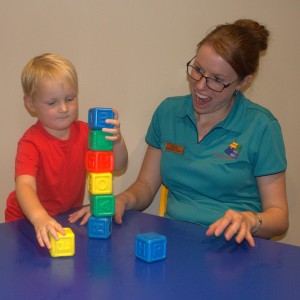 5. Use lots of repetition. Young children learn though repetition. Repeat words, rhymes, actions, stories, games and songs. Play games where you can repeat a word or action over and over such as peek-a-boo, or stacking blocks “up, up, up, down”.
5. Use lots of repetition. Young children learn though repetition. Repeat words, rhymes, actions, stories, games and songs. Play games where you can repeat a word or action over and over such as peek-a-boo, or stacking blocks “up, up, up, down”.
6. Encourage imitation. Babies and toddlers learn so much by copying. Copy your baby’s sounds and actions and soon they will begin to copy you. Be surprised and delighted when they copy you and they will want to do it again and again. Repeat something they know a few times then try something new and see if they can copy that too.
7. Offer choices as often as you can. As adults we often make small decisions for children that they could make themselves which would allow them to learn and develop communication skills. Often these small things don’t really matter, it just takes a little more time for your child to decide, but this is worth it to develop their skills. Only offer choices you are happy for your child to make though.
Before your baby can talk they can make choices by pointing, reaching or even just looking at the one they want. Hold up two items, maybe a choice of two foods or two different toys to start with and see which one they show you they want. Tell them the name of the thing they choose and give it to them. They will learn the power of communicating successfully with others and be on their way to developing vital skills.
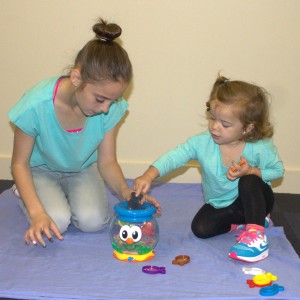 8. Encourage turn taking. Try to structure your play activities so you and your child take turns and are equally active. Once you have taken your turn, pause and wait with anticipation for your child to take another turn.
8. Encourage turn taking. Try to structure your play activities so you and your child take turns and are equally active. Once you have taken your turn, pause and wait with anticipation for your child to take another turn.
Show them using body language, that you expect a response. Silently count to five before saying or doing anything. You can also practice turn taking with simple, fun games such as peek-a boo, rolling a ball back and forth, taking turns to blowing bubbles or stack blocks.
9. Introduce books as soon as possible. Reading to your child is one of the best things you can do to help them learn. Make it a part of your day every day. Read new books but also repeat favourite ones over and over. Babies love simple books with bright colours, pictures of familiar things and friendly faces, textures to touch and surprise flaps to explore.
10. Offer quality learning opportunities as much as possible. Remember that you are your child’s favourite and most educational plaything. A small amount of screen time is fine but not more than 2 hours per day is recommended for young children. Think about the quality of the programs and whether they are suitable for your child’s age. Also think about the toys you give your child to play with. They should be safe, bright, colourful and age appropriate.
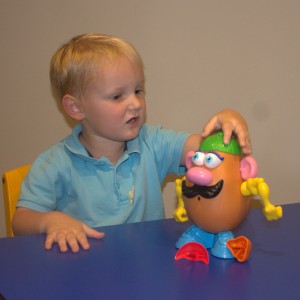 Some inexpensive toys can be used in many ways, develop many skills and grow with your child; such as blocks, cars and trucks, dolls and animals, pretend toys such as tea sets. Sometimes expensive electronic items can only be used in a limited way and so children may tire of them quickly. Your child may have more fun and learn more doing something simple with you, such as playing with the pegs while you hang the washing than playing alone with an expensive gadget.
Some inexpensive toys can be used in many ways, develop many skills and grow with your child; such as blocks, cars and trucks, dolls and animals, pretend toys such as tea sets. Sometimes expensive electronic items can only be used in a limited way and so children may tire of them quickly. Your child may have more fun and learn more doing something simple with you, such as playing with the pegs while you hang the washing than playing alone with an expensive gadget.
Raising babies and toddlers is hard work but it is a special time that passes quickly so remember to take the time to enjoy your child as they grow and develop.
If you are concerned about your child's development including speech, language, play skills, social communication skills, social skills or learning check our website to see how Talking Matters may be able to help. For more ideas and resources check the resources section on our website and our extensive Pinterest page. Like us on Facebook and follow us on Twitter so you don't miss out on what's happening.
Related Blog Posts
If you liked this post you may also like:
Talking babies and toddlers
All about questions
Top Toys for Toddlers
FAQ Speech pathology



